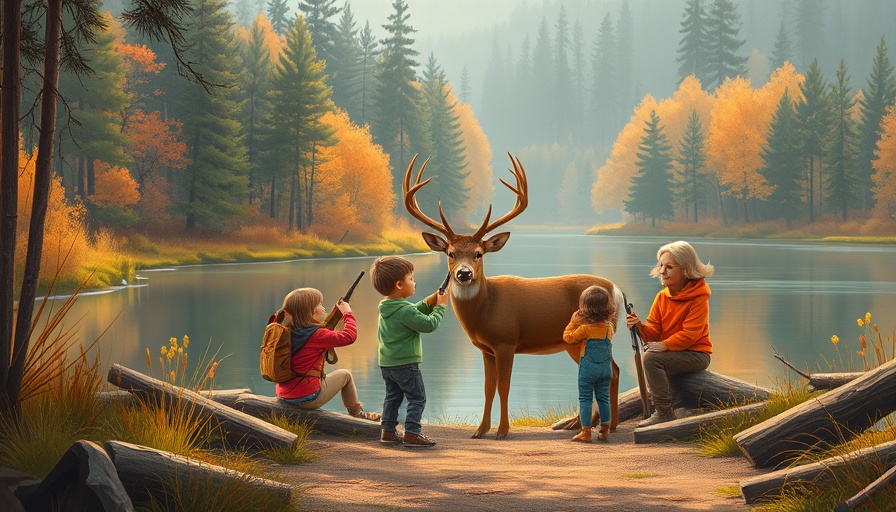
The Gift of the Great Outdoors: Teaching Youth Through Experience
Taking a child on their first deer hunt can be a transformative experience for both the young hunter and their mentor. It transcends just the act of hunting; it’s about building connections, sharing valuable lessons, and fostering an appreciation for nature. The journey begins with acknowledging that the hunt is not just another outing; it’s a meaningful learning opportunity for both parties involved.
Why Youth Hunting is More Than Simply a Game
Introducing kids to deer hunting brings them closer to understanding nature and the cycle of life. As noted in insights from seasoned hunters, it’s crucial to frame the experience positively. Rather than pushing a child to succeed, the focus should be shifted to ensuring they enjoy the hunt and learn from it. Just like any other aspect of life, childhood experiences shape attitudes towards the outdoors and hunting. By approaching hunting this way, mentors can help nurture a lifelong relationship with nature.
Setting Expectations: It’s Their Hunt, Not Yours
When inviting a child out for their first hunt, it’s important to remember: the outing should be tailored to suit their needs and interests. As suggested in various hunting articles, adults—especially parents—often have strong emotional investments in the success of the hunt. While it's natural to want the best for a budding hunter, it’s vital to ensure that the child’s comfort and enjoyment take precedence. Whether this means adjusting hunting hours to avoid bitterly cold days or selecting locations that offer reasonable expectations of success, the focus should remain on the kids’ enjoyment and engagement with the experience.
The Learning Curve: Life Lessons Beyond Hunting
Kids can learn valuable skills during their hunting experiences that extend far beyond the hunt itself. From patience, persistence, respecting nature, to understanding the gravity of life and death, the lessons are profound. Any experienced mentor will tell you that it’s through their failures that young hunters develop resilience and skill. They might miss their shot the first couple of times, but every mistake will teach them something new. The opportunity to learn and grow in challenging yet supportive environments translates to various aspects of life.
Creating Lasting Memories and Bonding Through Nature
Hunting can serve as a special bonding time between parent and child, thickening familial ties while sharing unforgettable experiences in nature. Every moment spent in the woods, whether it’s waiting in silence for a deer to appear or discussing the different animal tracks, lays down the foundation for lasting memories. This connection reinforces the importance of health and wellness through physical activity and outdoor living, factors crucial for well-being.
Practical Tips for First-Time Youth Hunters
As families in the MidSouth venture into this cherished tradition, here are several practical tips to make the process enjoyable and educational:
- Start Slow: Begin with small game before moving on to deer hunting. This builds foundational skills and confidence.
- Emphasize Safety and Patience: Ensure that the child understands safety protocols and the need for patience during hunts.
- Encourage Exploration: Let the child get intimately familiar with their surroundings. Allow them to scout locations and find trails, solidifying their connection to the land.
- Foster Comfort: Dress appropriately for weather conditions. Warm clothing and comfortable gear are crucial for keeping the young hunter focused.
- Make It Fun: Create an enjoyable atmosphere. Incorporating games, stories, or snacks can help maintain their interest.
Join the Hunting Community: Resources for Young Hunters
Many organizations and communities exist to support new hunters. Joining local hunting clubs can provide mentorship opportunities as well as workshops on safe hunting practices. Additionally, discussing hunting ethics and conservation within these groups can help children appreciate the responsibility that comes with being hunters.
Final Thoughts: An Invitation to Nature
Inviting a young hunter into the world of deer hunting offers an excellent opportunity to impart crucial life lessons, promote outdoor activities, and solidify bonds. It’s about creating stories together—stories that children will carry into adulthood. With each adventure in the field, they will discover not only the thrill of the hunt but the beauty of the wild and the responsibility that comes with it.
This season, consider taking a child deer hunting, and join the ranks of countless parents and mentors sharing joy and knowledge. Through patience, support, and guidance, you can help shape a child's understanding of nature and hunting, ensuring the next generation values and protects the wilderness.
 Add Row
Add Row  Add
Add 



Write A Comment